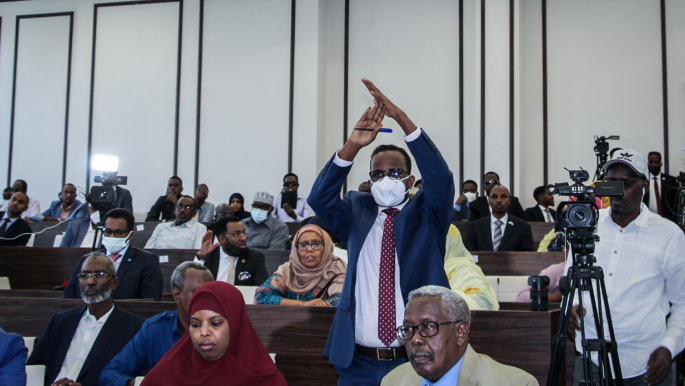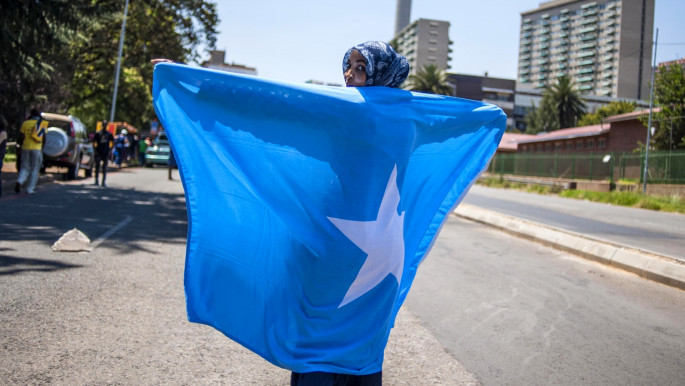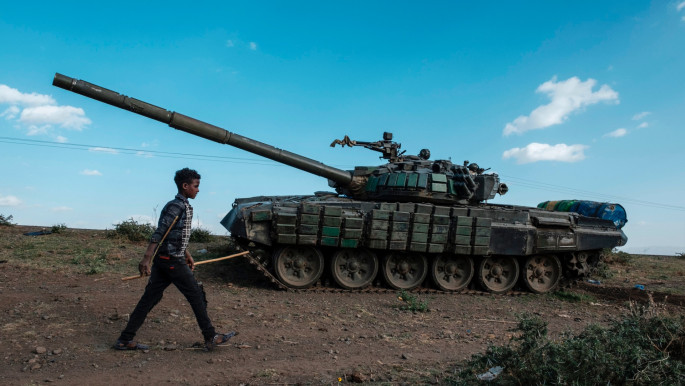Can Somalia's prime minister end the country's election crisis?
Whilst the extension was meant to put the country on a path to a one person, one vote election, opposition politicians and two of Somalia's federal member states viewed it as an unlawful power grab and have been pushing for a return to an indirect model agreed in September.
The government and opposition exchanged blame for what caused talks to break down, with none of the important issues getting ironed out before the president returned the question to the Somali parliament's lower house.
In a move welcomed by Somalia's opposition and federal member states however, President Mohammed Abdullahi Farmajo backtracked and delegated responsibility for the election's security and implementation to Prime Minister Mohamed Hussein Roble.
Abdi Barud, a senior advisor to Farmajo's last prime minister Hassan Khaire, told The New Arab that the current prime minister is a newcomer in politics and though he's relatively untested he is seen as a "less divisive and more conciliatory figure than the president."
Somalia's political players want to give the prime minister the benefit of the doubt, says Barud, but there are still challenges.
 |
Now Farmajo's official term has come to an end, the inability of Somalia's leaders to reach an agreement threatens to undo a lot of the steady progress over the last few years |  |
"What will be his relationship with his boss who is a candidate? Can he demonstrate the necessary authority and capacity to manage the security agencies which are much divided now because of the recent tensions?"
So far, Roble appears to be off to a good start. He has assured stakeholders that "free, fair and transparent" elections would be promptly organised and invited the federal member states to a National Consultative Forum late May on how to implement it. He's also been energetically meeting with significant candidates in the upcoming polls for consultations.
 |
|
| Read more: Five things to know about Somalia's political crisis |
In a hotly anticipated speech in the early hours of last Wednesday, Farmajo gave his first clear signal that he was prepared to change tact on the election.
He said "the only path open for a successful solution is dialogue, compromise, & return to the negotiating table", committing the federal government to returning to the 17 September agreement without preconditions.
Earlier that day, three of Somalia's federal member states, previously allied with the president, broke with him and said they opposed the term extension. They called for the country to immediately hold elections according to the 17 September agreement which was welcomed by the prime minister's office.
The political U-turn came after tensions in Mogadishu spilled over into violence when members of Somalia's security forces joined protesters opposing the term extension and clashed with other members of the armed forces.
Former President Sharif Sheikh Ahmed said the violence in the capital city was the result of the decision by parliament to extend its mandate. According to the UN's humanitarian agency, at least 60,000 people were forced to flee their homes because of the violence.
 |
The prime minister is a newcomer in politics and though he's relatively untested he is seen as a less divisive and more conciliatory figure than the president |  |
One resident who spoke to The New Arab lives in a neighbourhood in north Mogadishu where some of the clashes took place. He left his house that night fearing for his safety. "You can't imagine what happened, even the trees weren't spared," he said.
Still emerging from war, Somalis were sanguine about the prospect of what a Farmajo presidency could bring. Now as his official term has come to an end, the inability of Somalia's leaders to reach an agreement threatens to undo a lot of the steady progress over the last few years.
To that effect, the EU's envoy to the country called on Somalia's leaders to immediately "demilitarize Mogadishu" where militias are still posted in various parts of the city.
Abdurrahman Ahmed, a student who lives in the Howlwadaag district where opposition forces set up bases, also had to leave his house that night but has since returned. "People were frightened, and kids couldn't sleep," he told The New Arab.
"The physical damage wasn't so great," he continues, "but the psychological impact for people was serious. I left because I wondered what would happen tomorrow, but others I know totally left Mogadishu and returned to their regions."
 |
|
| Read more: Somalia's political deadlock: Why have elections been delayed? |
Where do things go from here?
Somalia's leaders must now negotiate a way to hold an election but the substantive differences between the electoral stakeholders on the details of the September agreement remain unaddressed and its implementation contested.
Mohammed Ibrahim Shire, a Somali risk analyst and lecturer at the University of Portsmouth, previously told The New Arab that outstanding issues included the makeup of the electoral committee, the process by which Somaliland's MPs would be elected, and who would conduct the election in the Gedo region of Jubaland.
Compounding those issues is a lack of trust between members of Somalia's political elite following clashes during February protests, says Barud. "National security forces were used to attack opposition members, including two former heads of state."
Those protests happened during a tense few days in Mogadishu shortly following the end of the government's official mandate. Yusuf Indhacade, an infamous general whose forces were responsible for the security of the demonstrators, told Dalsan TV the night before that the country has no government.
The clashes were quickly contained but they left a bitter taste in the mouths of Somalia's leaders and contributed to an already deeply polarised political environment.
 |
Somalia's leaders must now negotiate a way to hold an election, but the substantive differences between the electoral stakeholders on the details of the September agreement remain unaddressed and its implementation contested |  |
There was no clearer example of the trust deficit than the arrival of Said Deni in Mogadishu before April's talks broke down, when he showed up with a heavily armed convoy of troops from Puntland's security forces.
Farmajo outlined his views of the situation in a candid interview with Shabelle TV, where he argued that he made many compromises but that the opposition kept adding new requirements for the completion of an agreement.
"The two men [Said Deni & Ahmed Madobe] went to Abu Dhabi and Nairobi," he said, "they were gone for two months and they turned their phones off and they came back with new demands."
But the president was adamant about two issues: that he wouldn't step aside or accept international involvement in Somalia's upcoming polls - a key opposition demand.
 |
|
| Read more: What will Biden's presidency mean for the Horn of Africa? |
"When it became clear that these leaders were stuck on the point of dismissing the parliament, dismissing the government, dismissing the army, and asking to sit beneath the international community and ruin our nation, then it became parliament's responsibility to take its right," he continued.
The international community is "part and parcel of the ever-morphing political dilemma in Somalia," Abukar Arman, a former Somali diplomat and commentator on Somali affairs, told The New Arab.
Whilst the international community can play a role in pressuring stakeholders to talk, Arman continued, a sustainable solution requires "Somali-owned and sponsored genuine reconciliation".
The path however appears to be a bumpy one. Speaking to VOA Somali, elder statesman and former Hirshabelle state president Mohamed Abdi Ware highlighted two important points of difference.
"They disagree on the destiny, vision and direction of the country and the kind of government we will have," he said. But the election issues themselves, he continued, are lower-level tactical disputes as the electoral process will impact its outcome.
The next presidency will be a critical one and all stakeholders realise that. Resolving their issues, Ware said, will require confidence building and good faith negotiation.
The decision to allow the prime minister to manage the elections is expected to help in this regard, as he won't be running as a candidate himself.
"Farmajo is a good negotiator, but he didn't engage in the last round of negotiations in good faith. He militarised the election and attempted to block the movements of the candidates," Barud says. "This is far from the end though, we are just at the beginning of the journey with a very untested driver."
"But we are in a better place today than we were yesterday, not sure about tomorrow."
Follow him on Twitter: @fromadic92





 Follow the Middle East's top stories in English at The New Arab on Google News
Follow the Middle East's top stories in English at The New Arab on Google News


